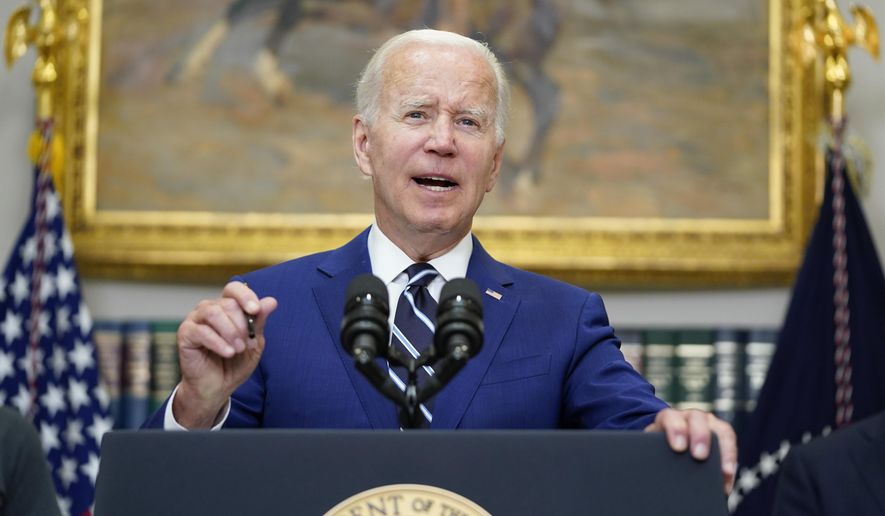President Biden is expected to call on Congress to suspend the federal gasoline and diesel tax through the end of September on Wednesday as part of a comprehensive plan to offer some relief to consumers facing painfully high prices at the pump.
The White House will also call for state and local governments to offer relief to consumers through temporary gas- or sales-tax waivers, and for the oil industry to increase supply and refining capacity, as part of the plan.
“In this unique moment, when [Russian President Vladimir] Putin’s attack on Ukraine is squeezing American families, the president believes the Congress should do what it can,” a senior administration official said. “Likewise, he believes that states, oil companies and retailers have a responsibility in this unique moment to do their part to ameliorate Putin’s price hike.”
Taken together, the White House believes the actions could reduce fuel prices by up to $1 per gallon.
Pausing the federal gasoline tax, which is 18.4 cents per gallon on gasoline and 24 cents per gallon on diesel, has been a thorny issue for Mr. Biden as he is pummeled with criticism for the high pump prices.
Democrats on Capitol Hill are split on it. Some fear the savings may not get passed down to drivers. Others oppose losing the roughly $10 billion it would cost the Highway Trust Fund that pays for transportation infrastructure projects.
The White House plan calls for temporarily waiving the tax while tapping into other revenue streams to keep the Highway Trust Fund whole.
More than 20 states have proposed a holiday from state gas taxes. Just five — Maryland, Georgia, Connecticut, New York and Florida — have gone through with it.
The Biden administration has warmed to the idea as the busy summer driving season gets underway and with high prices expected to persist as the November elections draw near.
Mr. Biden is also proposing other measures at the state and local level such as a temporary relief from sales tax or through consumer rebates.
The plan adds to the White House pressure on oil companies.
Mr. Biden has claimed that corporate greed is to blame for sky-high prices and told major oil companies in a letter last week that “refinery profit margins well above normal being passed directly onto American families are not acceptable.”
He also warned that he could use the Defense Production Act to force the industry’s hand.
The comments have sparked a tense row between the oil executives and the White House.
Chevron on Tuesday told Mr. Biden that if he is truly interested in blunting high gas prices, his administration should stop demonizing oil companies and instead engage in “honest dialogue” about the importance of domestic oil production.
Mike Wirth, chair and CEO of the energy giant, said “clarity and consistency” from the White House on energy policy would do more to rein in gasoline prices than name-calling and threats.
“Addressing this situation requires thoughtful action and a willingness to work together, not political rhetoric,” Mr. Wirth wrote in a letter.
Speaking to reporters, Mr. Biden labeled Mr. Wirth’s words as “mildly sensitive” and reiterated his call for more refining capacity.
Chevron is already working to ramp up its output, according to Mr. Wirth. The company is putting an extra $18 billion this year — a more than 50% increase from last year — toward boosting production to meet a lack of supply stemming from the pandemic and Russia’s war on Ukraine.
Still, Mr. Biden’s plan calls for squeezing even more juice out of the oil industry.
Senior administration officials said the president’s plan calls for the oil industry “to put its record profits to work and step up with more supply and more refining capacity to bring down gas prices.”
Energy Secretary Jennifer Granholm and other administration officials are set to meet Thursday at the White House with major oil companies, including Chevron and ExxonMobil to work out concrete solutions.
Mr. Biden will not attend. The White House has declined to specify why.
White House press secretary Karine Jean-Pierre characterized the get-together as a meaningful “first step” toward combating high gas prices.
“Our goal is to make sure we have a sit-down conversation, and we come up with solutions that we’ve worked with the CEOs and figure out what else we can do,” she said.
Correction: A previous version of this story misstated the estimated impact of the temporary federal gas tax waiver to the Highway Trust Fund. The White House estimates that the three-month waiver of the federal gas tax will cost roughly $10 billion.
• Joseph Clark can be reached at jclark@washingtontimes.com.
• Ramsey Touchberry can be reached at rtouchberry@washingtontimes.com.




Please read our comment policy before commenting.